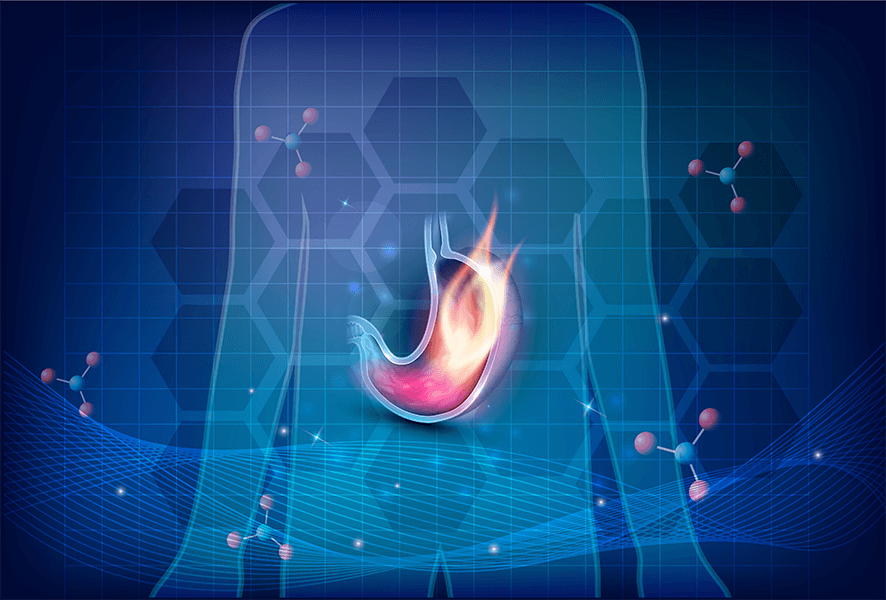What is gastroesophageal reflux disease (GERD)?
Gastroesophageal reflux disease or GERD is a term used to describe the result of the common experience of acid reflux in an individual.
Acid reflux refers to a single occurrence or instance of acid backflow from the stomach into the esophagus, described as heartburn.
Someone is usually diagnosed with GERD when acid reflux happens in mild cases one or fewer times a week or when moderate-to-severe acid reflux occurs at least twice a week. GERD can occur at any age, but it typically begins around age 40. If left untreated, patients can eventually develop a condition known as Barrett’s esophagus. If you think you may have gastroesophageal reflux disease, we encourage you to visit a gastroenterologist at a GI Alliance location near you.

What causes GERD?
When you swallow food, it passes through the esophagus and past the lower esophageal sphincter (LES) into the stomach. When the LES becomes compromised, it can weaken and allow stomach acid to flow back into the esophagus. In most cases, there is not a single cause that leads to this happening often, but you are more likely to have or develop GERD if you meet one or more of the following criteria:
- Obesity
- Pregnancy
- Hiatal hernia (when the upper part of the stomach bulges through the diaphragm)
- Scleroderma (a connective tissue disorder)
- Tobacco use
- Alcohol use
- Eat large meals late at night
- Eat spicy foods
- Eat raw onion or garlic
- Lie down often after eating
- Drink coffee
What are the major symptoms of GERD?
The major symptoms of GERD are similar to acid reflux but may occur more frequently. Those symptoms include:
- Chest pain
- Regurgitation of food or sour liquids
- Lump-in-the-throat sensation
- Bloating
- Dysphagia
- Unexplained weight loss
- Chronic cough
- Laryngitis
- Asthma
- Disrupted sleep
You should make an appointment with a gastroenterologist at GI Alliance today if you experience any of these symptoms frequently and are in pain, or if you take over-the-counter-heartburn medication more than twice a week.
What are the available treatments for GERD?
Treating gastroesophageal reflux disease may include lifestyle changes, medical intervention, or both. Treatments to prevent or relieve GERD include:
- Avoid foods and beverages prone to cause acid reflux (see those mentioned above)
- Eat slowly and in moderation
- Stay awake and stand up after eating
- Do not eat within a minimum of two hours before going to bed
- Sleep on an incline with the head raised above the feet
- Quit smoking
- Lose weight (if overweight)
- Tell your gastroenterologist about current medications you are taking
- Limit coffee/caffeine intake
- Over-the-counter antacids
- Prescription-strength antacids (H-2 receptor blockers)
- Medication to strengthen the LES
- Fundoplication (surgery wrapping the stomach around the LES)
- LINX device (magnetic beads wrapped around the junction of the stomach and esophagus)

Find relief from GERD
GERD FAQs
How can I tell if I have GERD or acid reflux?
The distinction between acid reflux and gastroesophageal reflux disease may seem confusing. However, GERD is simply acid reflux that happens more frequently for a prolonged amount of time. Should you have heartburn or other symptoms every day or multiple times throughout the week, or you experience symptoms that do not subside with over-the-counter medications, you might be experiencing GERD.
Are there any foods I should avoid if I have gastroesophageal reflux disease?
Foods that aid in the development of stomach acid should probably be avoided if you experience GERD. A few examples include:
- Spicy foods
- Caffeinated beverages
- Foods high in fat
- Foods high in sugar
- Red meat
- Onion
- Garlic
- Salty or peppery foods
- Oranges, grapefruits, and other citrus fruits
At GI Alliance, our gastroenterology team can provide more information on foods to avoid if you are diagnosed with GERD.
Can GERD shorten my lifespan?
GERD is typically not life-threatening. It may make daily tasks a bit harder from time to time, but you should be able to find some relief from symptoms with a good treatment method. If left untreated, gastroesophageal reflux disease could lead to additional gastrointestinal conditions. Examples include esophagitis (inflammation of the esophageal lining) and Barrett’s esophagus, a condition that damages the esophagus (the tube that bridges the mouth to the stomach). Getting the care needed for GERD can help preserve your health.
How long does it take GERD to improve after treatment?
Certain factors help determine how long it might take to feel better following treatment for gastroesophageal reflux disease. These can include the type of medication you are taking, how much damage has occurred from GERD up until diagnosis, and how diligently you avoid foods and drinks that worsen symptoms. However, GERD symptoms should begin to diminish with treatment. While you might not be able to get rid of GERD completely, you can likely alleviate its effects.
